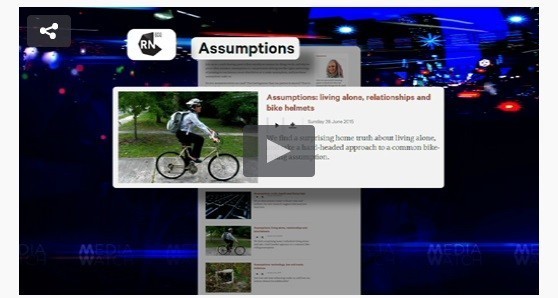
Media Watch took the Radio National program Assumptions to task on Monday night for the way it conducted a segment questioning the belief that Australia’s mandatory helmet law is good policy.
Assumptions is all about being contrary. In recent weeks it has challenged the idea that “terrorists are crazy” and that “corruption never serves a useful purpose.” And next week Susan Carland enters dangerous territory again…
The podcast of that program—which goes to air next Sunday—is already online, and its claims from Alan Todd, national president of Freestyle Cyclists, and a crusader against Australia’s compulsory bike helmet laws, have already sent road safety experts flocking to Media Watch to complain.
I’ve looked closely at the mandatory helmet law many times in the past and can confirm this is indeed “dangerous territory”; there’s lots of blood in this debate and not much spleen. I suspect neither Assumptions nor Media Watch truly understood what they might be getting into.
I don’t want to reprise the relative merits of the arguments around the helmet law. I’m going to discuss something else from Monday’s Media Watch instead; specifically, Paul Barry’s claim in his introduction that Assumptions “is all about being contrary”.
‘Contrary’ is a heavily freighted term. It’s not one that should ever be used lightly and I don’t think it was; I think Media Watch used it with deliberate purpose. Here are the first two definitions of ‘contrary’ thrown up by Google:
- Opposite in nature, direction, or meaning.
- Perversely inclined to disagree or to do the opposite of what is expected or desired.
That looks pretty negative; ‘contrary’ (or ‘contrarian’) is a derisive term frequently used to undermine the legitimacy of another point of view. It’s often conflated with ‘denialism’, which means holding a view that’s irrational because it’s contrary to the empirically verifiable facts e.g. insisting the earth is flat. (1).
That’s not how Assumptions sees itself. The program describes its purpose as:
delving into the rights and wrongs of jumping to conclusions (and into) what drives us to make assumptions, and how those assumptions make us.
It invites listeners to “join us on a myth-busting quest to find out why we assume the things we do, and why we are so often mistaken”. When Susan Carland introduces the segment on the mandatory helmet law she makes it clear she’s taking us on “a fact checking journey”.
The program’s producer, Rachel Carbonell, provides a thoughtful view on the topic in this opinion piece published by Fairfax earlier this month, Opinion, belief or prejudice – what are assumptions exactly? She shows some of the dangers and consequences of untested assumptions.
Questioning common assumptions, the accepted wisdom, the status quo, or whatever it’s called isn’t ‘contrarian’; it isn’t a perverse inclination to do the opposite. We humans are full of psychological biases. The world is riddled with implicit assumptions that can’t withstand even casual scrutiny. Wrong-headedness isn’t exceptional, it’s common.
Much of what’s labelled ‘contrarian’ is simply a different but legitimate point of view. For example, the competing positions in the debate on the mandatory helmet law are all plausible; you might disagree with one or the other but they’re not the inventions of dedicated recalcitrants.
If anything, there should be many more programs that question stereotypes, received wisdom, inner narratives, “fast” thinking, or whatever you want to call the phenomenon of relying on unscrutinised assumptions.
The irony is that questioning the common wisdom is a large part of what the media says it does.
It frames practically everything governments do as an issue e.g. too much density, too little density, apartments too small, houses too big, too many roads, too few roads, and so on. Establishing that there are other points of view is pretty much why journalists suppose they exist.
That’s not perverse though; if it’s done well it provides another perspective that can lead to better outcomes.
There’s more than one point of view on almost every issue of public policy and they can all usually be traced back to differences in “assumptions”. It’s the idea that there’s only one that’s valid (e.g. the helmet law is good) – and that citing any other one is an aberrant inclination to disagree (e.g. the helmet law is bad) – that’s wilfully obdurate.
If there’s anything perverse going on it’s the tendency of some media organisations to select and frame stories with the primary intention of appealing to their readers existing prejudices. That’s shaping the news to serve a commercial imperative.
_________________________________
-
According to Paul O’shea, ‘denialism’ is “the refusal to accept an empirically verifiable reality. It is an essentially irrational action that withholds validation of a historical experience or event”. By this definition, it’s a term that’s routinely used wrongly in public debate.








Crikey is committed to hosting lively discussions. Help us keep the conversation useful, interesting and welcoming. We aim to publish comments quickly in the interest of promoting robust conversation, but we’re a small team and we deploy filters to protect against legal risk. Occasionally your comment may be held up while we review, but we’re working as fast as we can to keep the conversation rolling.
The Crikey comment section is members-only content. Please subscribe to leave a comment.
The Crikey comment section is members-only content. Please login to leave a comment.